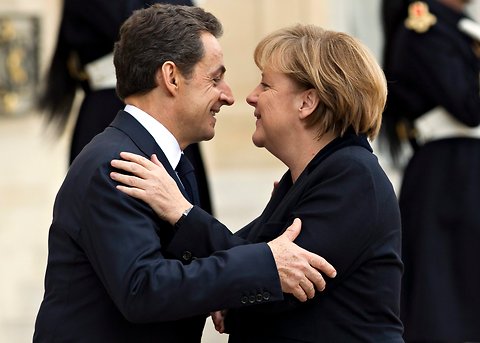Spain, which along with Italy is a euro zone member whose debt problems reverberate across the region, provided a measure of relief by raising $7.8 billion in a debt auction in Madrid at a lower-than-expected interest rate. Demand was brisk, perhaps on optimism for the new, conservative government that is about to be sworn in, and also because it was one of the last big bond auctions in Europe before the year-end holiday lull.
The yield on Italy’s debt was also modestly lower in trading Thursday, as the government in Rome called a confidence vote for Friday on a new austerity package.
Meanwhile, the euro currency regained some of its recent losses against the dollar. Stocks in Europe and the United States were also broadly higher.
Helping to buoy the markets, Russia said Thursday that it might pledge up to $20 billion via the International Monetary Fund to lend support to the euro zone’s financial markets and economy.
After meeting with European Union leaders here, the Russian president, Dmitri A. Medvedev, said his country was “interested in the European Union’s preservation as a dynamic economic and political force” and would consider assistance via the I.M.F. Though Russian leaders and officials face criticism for the conduct of recent elections, they arrived at the meeting in a strong position, knowing that Europe was seeking help from Moscow as well as courting other countries, like China and Brazil.
Mr. Medvedev’s economic aide, Arkady V. Dvorkovich, said Russia would be ready immediately to let the I.M.F. keep $10 billion from a commitment made in 2009 that, he said, was due to be reimbursed.
A possible second loan from Russia of up to $10 billion was dependent on clearer plans emerging for the financing of a firewall for still-vulnerable euro zone nations like Italy and Spain, Mr. Dvorkovich added.
Although such amounts would be relatively modest compared with the hundreds of billions of dollars of rescue reserves that many economists say might be necessary to maintain investor confidence in the euro zone, analysts saw at least symbolic significance in the Russian offer.
“There has been a sort of strategic inversion in relations between Russia and the E.U.,” said Thomas Gomart of the Institute for International Relations in Paris. “In 1998, Russia defaulted, and around 14 years later, Russia is in a position to finance Europe. Psychologically, that is a very big change.”
While Russia might be willing to pitch in, the head of the European Central Bank on Thursday repeated his recent assertions that the central bank would not respond to widespread calls that it provide a financial firewall for the region’s debt crisis by more aggressively buying government bonds.
In a Berlin speech, the bank’s president, Mario Draghi, said that the euro zone’s “firewall” was supposed to be the bailout fund set up by European governments.
And yet plans to increase the financial firepower of that bailout fund, the European Financial Stability Facility, to 1 trillion euros ($1.3 trillion) — the target set by European Union leaders — have fallen short. The I.M.F. is expected to help make up some of the shortfall, but the fund is still waiting to hear the details of how the euro zone will put together a new contribution of up to 200 billion euros to the I.M.F.
Another European Union summit meeting on the crisis has been tentatively scheduled for the end of January or beginning of February.
Where some analysts see the European Central Bank as being more effective lately is in the new medium-term lending program for commercial banks that it announced last week. In the program, which goes into effect next week, the central bank will start providing banks loans for three years, compared with a previous maximum of about one year.
The central bank last week also cut its benchmark interest rate target to 1 percent from 1.25 percent.
Those moves, more than any new-found confidence in Spain, might help explain the success of Thursday’s Spanish bond auction. Charles Diebel, head of market strategy at Lloyds Banking Group in London, said demand was probably driven in part by banks’ taking advantage of low borrowing costs.
Stephen Castle reported from Brussels and David Jolly from Paris.
This article has been revised to reflect the following correction:
Correction: December 15, 2011
An earlier version of this article gave a wrong date for when the European Central Bank’s new medium-term bank financing program, announced last week, goes into effect. It is next week, not Thursday.
Article source: http://feeds.nytimes.com/click.phdo?i=5c7b996a7d9a21867f27eef1a2300e59


